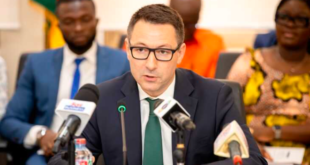New data released by the Bank of Ghana suggests that Ghana’s economy may have begun a rebound from the contractions it suffered during the second and third quarters of 2020 as a result of the adverse impact of COVID-19 and the requisite socio-economic restrictions imposed by government to curb the spread of infection.
The central bank’s Composite Index of Economic Activity grew strongly during the last quarter of 2020 and although the usual close correlation between the CIEA and Gross Domestic Product measurements conducted by the Ghana Statistical Service have loosened somewhat since the advent of the coronavirus pandemic, the sheer strength of the CIEA’s rise suggests that Ghana enjoyed a resumption of economic growth during the period.
However, the resurgence of COVID-19 and the requisite re-imposed restrictions threatens to be a dampener, on both economic activity and the underlying business and consumer confidence that drives it, although Ghana’s financial markets are showing defiance – interest rates continue to fall despite the BoG putting further monetary easing on hold for now; forward foreign exchange auctions conducted fortnightly by the central bank indicate confidence by forex users and their bankers that the cedi’s exchange rate will continue to hold steady at least over the next two months; and equities listed on the Ghana Stock Exchange have started enjoying a price surge after an unprecedented three consecutive years of bearish sentiment which have left many stocks fundamentally undervalued.
According to the latest BoG surveys “consumer confidence has remained firm at pre-lock down levels, reflecting optimism about current economic conditions following the gradual lifting of COVID-related restrictions.” The snag is that this survey was conducted before restrictions started being re-introduced and their re-introduction will push consumer sentiment in the other direction, a trend which will reflect in the next survey, the results of which will not be announced until late March, even though the sentiments are already in play now.
The latest BoG survey on business confidence also reveals that it has “increased significantly, reaching pre-lock down levels for the first time as businesses meet their short term company targets and have expressed positive sentiments about growth prospects.” Again, the circumstances have changed significantly since this survey was conducted but, as with consumer confidence, the results will not be revealed until late March.
Underlying all this are the actual economic outcomes. The BoG’s Composite Index of Economic Activity surged by 11.4 percent year on year up to November 2020, three and a half times the growth recorded over the previous 12 month period. This suggests strong economic growth; the CIEA tracks economic activity while the GDP growth data from the GSS tracks changes in the size of the economy, but since the two are correlated both tend to move in the same direction albeit at different paces.
But the peculiar circumstances created by COVID-19’s impact have loosened the correlation somewhat; instructively, the CIEA results announced in November revealed that economic activity was increasing but the GSS subsequently announced a 1.1 percent economic contraction for the third quarter. Nevertheless the sheer quantum of upward movement in the CIEA most recently strongly suggests that Ghana will record positive GDP growth for the last quarter of 2020, no matter how marginal.
Over the past fortnight, the conventional wisdom that Ghana is in the early stages of a sustained economic rebound after two successive quarters of economic contraction during 2020, is increasingly being called into question. Initial data emergent since late November indicating the start of a second wave of COVID-19 infections was not widely perturbing, ostensibly because both the political class and the electorate were all caught up in the excitement of the then-impending December 7 elections.
However, all that changed three weeks ago when President Nana Akufo Addo, in a televised address to the nation announced the re-introduction of limited restrictions on social activity, threatening further restrictions if Ghanaians failed to observe COVID-19 safety protocols. With the general populace having become notorious over the past nine months for refusing to comply with those protocols, public policy analysts and commentators are predicting more restrictions imminently, possibly culminating in an outright second lock down.
This has changed the outlook for Ghana’s economy in 2021; even the Bank of Ghana which has been one of the most enthusiastic believers in a quick economic rebound now warns that under the unfolding circumstances, fiscal consolidation will take longer than originally anticipated. By extension, so will its benefits.
Actually, even the generally accepted belief that an economic rebound has started since the fourth quarter of 2020 has not yet been confirmed by data. After the economy suffered an unprecedented 3.2 percent contraction in Gross Domestic Product, measured in year on year terms, during the second quarter of the year, following a wide range of socio-economic restrictions to curb the spread of COVID-19 including an outright lockdown of the country’s two biggest economic hubs for three weeks in April, the BOG forecast that a rebound would commence in the subsequent quarter, this projection based on early data received by the central bank.
But this did not happen. During the third quarter of last year the economy contracted again, albeit by a slower rate of 1.1 percent. This forced the BoG to revise its full-year growth forecast downwards, from the 2.0 – 2.5 percent it had forecast in late September; by late November, having received the third-quarter growth data from the Ghana Statistical Service, it announced that it expected growth of about one percent, roughly in line with the 0;9 percent forecast made by the Ministry of Finance in its mid-year budget review presentation to Parliament, made in July.
But even this is uncertain; the fourth-quarter data has not yet been released by the GSS and there is still the possibility that it will be disappointing, like the third quarter data that preceded it. If that happens and growth for the last quarter of the year turns out to be negative, or even just flat, Ghana could officially be termed to be in a recession – the formal definition of a recession is three consecutive quarters of negative growth.
This is highly unlikely though; the latest data from the BoG points to a rebound at the end of 2020, the challenge though is how to sustain it through a resurgence of both the COVID-19 pandemic itself and the consequent re-imposition of socio-economic restrictions.
Source: Goldstreet Business
 Home Of Ghana News Ghana News, Entertainment And More
Home Of Ghana News Ghana News, Entertainment And More




